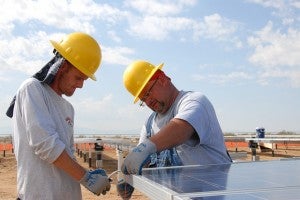Matching Veterans with Solar Jobs: Now that’s a Bright Idea
 During the next five years, 200,000 service members will transition from active duty military to civilian life. They will need jobs. The solar industry is booming and needs skilled workers. The math is simple.
During the next five years, 200,000 service members will transition from active duty military to civilian life. They will need jobs. The solar industry is booming and needs skilled workers. The math is simple.
The recently announced Solar Ready Vets program aims to help transitioning service members pursue training in the solar industry, which is adding 30,000 jobs a year, according to the U.S. Department of Energy (DOE).
Solar Ready Vets will focus on the specific needs of high-growth solar employers and build on the technical skills that veterans acquired during service. Solar Ready Vets is part of a larger DOE initiative to train 75,000 people for the solar workforce by 2020, some of whom are also veterans.
Initially, Solar Ready Vets will roll out at 10 military bases across the United States. Four bases in Colorado, California, Utah, and Virginia have been identified, and the other six will be selected based on the number of transitioning military personnel and strength of the solar market, among other things.
As a veteran, I am incredibly excited about Solar Ready Vets. Strong job opportunities in a growing solar market that leverage military experience are a huge win for everyone.
As a veteran, I am incredibly excited about Solar Ready Vets. Strong job opportunities in a growing solar market that leverage military experience are a huge win for everyone.
As a North Carolina resident, I am cautiously optimistic. We are one of only five states that currently do not allow for third-party solar sales. This could hinder North Carolina’s competitiveness for the program, despite being number four in the country for installed solar.
Solar is a huge market and closing the state off to third-party sales is bad for business, especially considering that solar companies are employing more and more veterans. North Carolina is home to 769,000 veterans and has an active duty population of nearly 110,000. Tens of thousands of service members will be transitioning out of the military over the next three years. Veteran jobs are a critical component of the state’s success.
But, I did say I was cautiously optimistic earlier, so I’ll tell you why: Army veteran and North Carolina House of Representatives member John Szoka (R-Cumberland) introduced a bill that would allow third-party sales, including on military installations. More opportunities for solar equals more job opportunities for veterans.
Also of note, Governor Pat McCrory made veteran retention a state priority. Strengthening a market sector that attracts veterans, increases economic opportunities, and increases energy security is a solid trifecta.
The ultimate goal is, of course, to have Solar Ready Vets at dozens of locations across the country as communities, businesses, universities and military bases increasingly turn to clean energy to lower costs and reduce dependence on fossil fuels.
DOE still needs to pick more military bases for its pilot program. Third-party sales will help make North Carolina a stronger contender. What are we waiting for?












6 Comments
This is one of those things that makes so much sense that it should have STRONG bipartisan support.
Thank you, Jason. Veteran jobs are indeed a bipartisan issue and hopefully so are policies that support them.
Great article Stephanie. I hope NC chooses to allow 3rd party finance models, our installer partners would love to be active there. And we NEED people with skills and direct solar training. Very excited about the program.
Be well.
Thanks! So great to hear from you! The White House is aggressively pushing this initiative, so once DOE selects the final 6 for its pilot program, I think we’ll see a lot of states vying for a spot. I’ll certainly keep you posted.
Great article Stephanie. Company where I’m currently working at just made the Joining Forces commitment this year. Keep up the good fight!
Thank you for your comments, the encouragement, and for being part of an organization that values vets, Frank! It’s so important for companies to demonstrate that hiring vets makes great business sense- Joining Forces is a great program to facilitate that.